|
|
|
Sort Order |
|
|
|
Items / Page
|
|
|
|
|
|
|
| Srl | Item |
| 1 |
ID:
127065
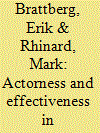

|
|
|
|
|
| Publication |
2013.
|
| Summary/Abstract |
This article examines the role of the European Union (EU) and United States as actors in international disaster relief. We take the analysis of 'actorness' one step further than normal by assessing the extent to which different aspects of EU and US actorness led to effectiveness in actual outcomes. In doing so, we make two contributions. First, we provide a rare comparison between EU and US foreign policy actorness, shedding light on the actor capability of each bloc in the area of international disaster relief. Second, we specify the relationship between actorness and effectiveness, a relationship which is too often assumed rather than explored. Using previous research of EU and US actorness as a starting point, we link four aspects of actorness to effectiveness and assess the resulting hypotheses using the case of the 2010 Haiti earthquake. We find support for our proposed links between actorness and effectiveness, although further research is needed before robust conclusions can be drawn.
|
|
|
|
|
|
|
|
|
|
|
|
|
|
|
|
| 2 |
ID:
181529
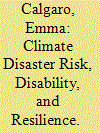

|
|
|
|
|
| Summary/Abstract |
This essay examines the everyday inequalities, stigmas, and injustices that leave people with disabilities highly vulnerable to escalating climate change risks. It argues that including people with disabilities in disaster risk reduction processes is essential to shaping inclusive, effective policies and practices. Examples of several programs that have done so are discussed. Focusing on the strengths of people with disabilities as resilient change-makers and as the experts in their own lives—instead of viewing them as dependent on others—can lead to the changes necessary to recognize their personal sovereignty and deliver disaster justice. Third in a series on disability rights around the world.
|
|
|
|
|
|
|
|
|
|
|
|
|
|
|
|
| 3 |
ID:
185223
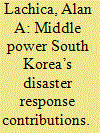

|
|
|
|
|
| Summary/Abstract |
Middle powers tend to display their expertise in areas where they possess a significant advantage, and this results in the creation of new international norms, especially on non-security issues. Disaster response is one area of international relations where middle powers project their images as good international citizens. This article discusses how middle power South Korea has displayed good international citizenship through its various contributions to global disaster response, such as participation in search and rescue operations, management and coordination of relief operations, and funding for humanitarian emergencies. South Korea’s involvement in disaster response is a middle power behaviour that demonstrates good international citizenship by allocating resources for global public goods. South Korea has utilized disaster response as part of its public diplomacy to promote its identity as a middle power and in seeking recognition as a reliable contributor to international development and stability.
|
|
|
|
|
|
|
|
|
|
|
|
|
|
|
|
| 4 |
ID:
171642
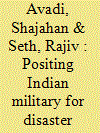

|
|
|
|
|
| Summary/Abstract |
Indian military has been traditionally part of government mechanism for dealing with natural disasters. This was due to lack of local administrations’ capacity to cope with increasing frequency and intensity of natural disasters. To address this dependence on military and for a holistic approach to disaster management, the Disaster Management Act, 2005 was enacted. The Act established a specialized civilian response agency, namely National Disaster Response Force (NDRF), and other institutional mechanisms. However, the dependence on military has not shown any decline. On the contrary, the dependence continues to increase in terms of both its extent and its frequency. Quantitative data in terms of quantities of rescue material distributed, number of people evacuated and so on, clearly establishes the continued dependence on military. A comparison of response operations by the military and the NDRF shows NDRF’s inadequacies in terms of its total number of personnel and geographical location. Hence, for the foreseeable future, dependence on military for disaster response will continue. The study underscores the critical need for civilian policymakers to re-define the role of military within the Disaster Management framework and for military planners to re-examine their own training and operational doctrines to play an effective role in disaster management.
|
|
|
|
|
|
|
|
|
|
|
|
|
|
|
|
| 5 |
ID:
151676
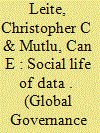

|
|
|
|
|
| Summary/Abstract |
Data presented in European Union documents have a social life of their own; they are collected, analyzed, disseminated, used, and reused. Along the way, data interact with different external elements—economic, social, and political actors, positions, and preferences—transforming their potential for different contexts and meanings. The Directorates-General are significant data actors, involved in both data-gathering and fact dissemination stages of data's social life and controlling the flows of data through the EU. This article focuses on the social life of two sets of data, tracing the evolution of these datasets into political discourses about disaster response and migration, and arguing that data never speak for themselves but rather evolve into facts through networks, which shape official policy discourses.
|
|
|
|
|
|
|
|
|
|
|
|
|
|
|
|
| 6 |
ID:
126076
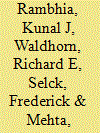

|
|
|
|
|
| Publication |
2012.
|
| Summary/Abstract |
Previous reports have identified the development of healthcare coalitions as the foundation for disaster response across the United States. This survey of acute care hospitals characterizes the current status of participation by US hospitals in healthcare coalitions for emergency preparedness planning and response. The survey results show the nearly universal nature of a coalition approach to disaster response. The results suggest a need for wide stakeholder involvement but also for flexibility in structure and organization. Based on the survey results, the authors make recommendations to guide the further development of healthcare coalitions and to improve local and national response to disasters.
|
|
|
|
|
|
|
|
|
|
|
|
|
|
|
|
| 7 |
ID:
152049
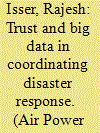

|
|
|
| 8 |
ID:
124012
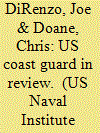

|
|
|
|
|
| Publication |
2012.
|
| Summary/Abstract |
In 2011 the U.S. Coast Guard continued its mission by responding to devastating hurricanes, floods, and droughts; interdicting maritime threats to our nation; supporting defense operations around the world; and seeking solutions to its expanding responsibilities in the Arctic.
|
|
|
|
|
|
|
|
|
|
|
|
|
|
|
|
|
|
|
|
|